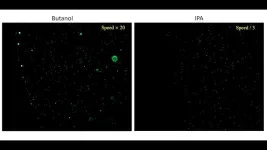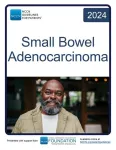In contrast, the scientists from the Lieber Institute for Brain Development did not find evidence that genetic ancestry is responsible for differences in the prevalence of psychiatric disorders and behavioral traits, such as schizophrenia and depression, across populations of European or African ancestry. Instead, those differences may be driven by variation in environmental exposures.
The study, the first to broadly explore specifically how African ancestry influences gene function in the human brain, is the first research to emerge from the African Ancestry Neuroscience Research Initiative. The initiative, known as AANRI, is a collaboration between the Lieber Institute — located on the Johns Hopkins medical campus in Baltimore — as well as African American community leaders from the city and Morgan State University, a public historically Black university also located in Baltimore.
“This landmark work enriches our understanding of the role of genetic ancestry in the brain, opens new avenues for the development of ancestry-aware therapeutics and paves the way for more equitable personalized medicine,” says Daniel Weinberger, M.D., Director and CEO of the Lieber Institute and senior author on the study.
The research notes that people of African ancestry account for less than 5% of data used in large-scale brain disorder research but are 20% more likely to experience a major mental health crisis, and up to twice as likely to manifest Alzheimer’s disease.
Lieber Institute scientists, including lead author and LIBD Associate Scientist Kynon Jade Benjamin, Ph.D., measured the genes present in over 425 brain samples from African American individuals, all medically healthy people. In addition, they focused on how the environment might impact the regulation of genes in the brain, a field of study called epigenetics. The scientists found that about 15% of the variation in gene expression in the brain was based on environmental differences in people of African ancestry.
“We inherit from our parents our DNA, the sequence of our genes, and they inherit their DNA from their parents, who got it from theirs, and so forth and so on,” says Dr. Weinberger. “Our genomes are the fingerprints of our near and distant ancestors who have contributed over time and generations various pieces of what becomes our individual genomes.”
Lieber Institute researchers identified more than 2,500 genes in the brains of individuals of African ancestry with significant differences in expression related to the proportion of each individual’s degree of African versus European ancestry. People of African descent are, in general, of mixed ancestry, with a range of about 0-60% European ancestry. The scientists were able to explore how much this ancestral variation within each brain predicted corresponding variation in gene abundance. The results showed that ancestry-informed genes were especially important in nonneuronal cells, particularly immune and vascular tissue cells.
This research confirms previous mechanisms that have been observed in the importance of vasculature in stroke. In fact, over 25% of the genetically determined probability of a stroke could be predicted by genes in vascular cells based on African ancestry proportion.
Even more strikingly, the scientists confirmed the importance of immune cells in liability for Alzheimer’s disease, with 30% of the genetic probability of this illness predictable by genes in immune cells based on African ancestry proportion in each brain.
The scientists also found differences that posed an advantage to people of African ancestry — for example, the brains from people of African ancestry showed a decrease in the expression of genes related to risk of Parkinson’s disease. This confirms public health data that shows lower rates of Parkinson’s disease in people of African ancestry.
The findings mean that scientists exploring new therapies to treat neurologic illness should consider targeting both neuronal and nonneuronal cells, such as immune and vascular tissue cells.
People of African ancestry are chronically neglected in studies that are driving the search for new treatments and cures by revealing genetic factors that influence disease. The Lieber Institute for Brain Development uses genomics and other advanced scientific techniques to learn more about the roots of brain disorders such as schizophrenia, depression, bipolar disorder, PTSD and autism.
More than 81% of large-scale genomic datasets used in this type of research come from people of European descent, though those of European background make up less than 16% of the world population. Human beings are more than 99% genetically identical. That less than 1% accounts for all human diversity on earth — and that’s the focus of AANRI, says Dr. Weinberger.
The Lieber Institute is home to the largest collection of postmortem brains for the study of neurodevelopmental disorders in the world. Each of the Institute’s more than 4,300 brains was donated by a recently bereaved family member through a rigorous informed consent process. Lieber Institute scientists used about 425 brain samples from the collection, each from a person of African ancestry who was medically healthy, for the Nature Neuroscience study.
Medications are important interventions for brain disorders, but findings such as these highlight the need for policies that address social determinants of health such as pollution, access to nutritious food, high-quality health care and education, says Kafui Dzirasa, M.D., Ph.D., an Advisor to the African Ancestry Neuroscience Research Initiative, a Professor at Duke University School of Medicine and a Howard Hughes Medical Investigator.
“As we learn about brain function, and think how to better protect against the environment, some of the best things that we should be out there advocating for are policy changes,” says Dr. Dzirasa.
The findings in the Nature Neuroscience study also confirm the importance of programs like AANRI that work toward more diversity in medicine, says Dr. Alvin C. Hathaway Sr., Co-Founder of AANRI and retired pastor of the historic Union Baptist Church in Baltimore.
In its first four years, AANRI has received funding from the state of Maryland, Brown Financial Management in Baltimore, the Abell Foundation and the Chan Zuckerberg Initiative, as well as the Lieber Institute. It has brought students from Morgan State University to the Lieber Institute to prepare them for careers in neuroscience. It has established Lieber Institute scientists as faculty at Morgan State to support new neuroscience and biology courses at the historically Black university.
The Initiative’s first research paper is a critical step toward a more equitable field of neuroscience, says Dr. Hathaway.
“I’m deeply embedded in the African Ancestry Neuroscience Research Initiative because I can see glimmers of hope,” he says. “I see that we really can accelerate research for people of color. We can help scientists understand what it means to be culturally sensitive to a community.”
####
About the Lieber Institute for Brain Development (LIBD)
The mission of the Lieber Institute for Brain Development and the Maltz Research Laboratories is to translate the understanding of basic genetic and molecular mechanisms of schizophrenia and related developmental brain disorders into clinical advances that change the lives of affected individuals. LIBD is an independent, not-for-profit 501(c)(3) organization and a Maryland tax-exempt medical research institute affiliated with the Johns Hopkins University School of Medicine. The Lieber Institute’s brain repository of more than 4,300 human brains is the largest collection of postmortem brains for the study of neuropsychiatric disorders worldwide.
About Morgan State University (MSU)
Morgan State University is Maryland’s Preeminent Public Urban Research University and an Historically Black College and University (HBCU). Founded in 1867 as the Centenary Biblical Institute, MSU is today an R2 institution with a rapidly growing research portfolio aiming to become an R1 institution within our current 10-year strategic plan. MSU offers 140 academic programs (including 23 programs leading to the doctoral degree) and serves over 9,000 students.
The overall focus of the Center of Brain Health at MSU is to conduct rigorous research on brain science and health disparities and train a diverse body of scholars in brain science/neuroscience. The Center will be strategically situated at the intersection of the life sciences, information technology/engineering (big data, machine learning) and with a strong emphasis on health disparities research. A prominent focus of the Center will be on brain health related to African Americans, a very understudied area in brain research.
END





